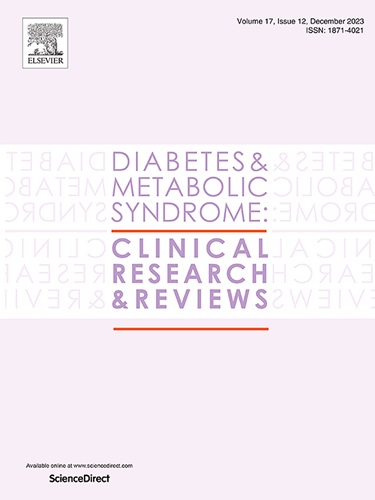Collaborative innovations in diabetes self-care for individuals with type 2 diabetes and schizophrenia: A Participatory Design study developing a diagnosis-specific educational manual
IF 3.4
Q1 ENDOCRINOLOGY & METABOLISM
Diabetes & Metabolic Syndrome-Clinical Research & Reviews
Pub Date : 2025-03-01
DOI:10.1016/j.dsx.2025.103220
引用次数: 0
Abstract
Background and aims
Individuals with schizophrenia are at high risk of developing type 2 diabetes. This study aimed to develop a tailored solution to address their complex diabetes care needs, based on insights from patients and healthcare professionals, to enhance self-care.
Methods
Using a Participatory Design approach, we conducted three workshops and an evaluation, which included focus groups, interviews, and written feedback. Patients, healthcare professionals, and stakeholders actively participated in all stages of the process between May 2022 and December 2023. Iterative processes ensured comprehensive input in idea generation and concept development. Data analysis followed the steps of planning, acting, observing, and reflecting. The study is reported using SRQR framework.
Results
Participants highlighted challenges such as navigating a fragmented healthcare system, undertreatment, and stigma. In response, a tailored educational manual for voluntary mentors was developed. This two-day training program equips mentors to support individuals with type 2 diabetes and schizophrenia, fostering collaboration and bridging the gap between psychiatric and somatic care.
Conclusions
A co-designed approach may enhance diabetes self-care and improve coordination between healthcare sectors.
2型糖尿病和精神分裂症患者糖尿病自我护理的协作创新:一项开发诊断特定教育手册的参与式设计研究
背景和目的精神分裂症患者发展为2型糖尿病的风险较高。本研究旨在根据患者和医疗保健专业人员的见解,开发一种量身定制的解决方案,以满足他们复杂的糖尿病护理需求,以增强自我保健。方法采用参与式设计方法,我们进行了三次研讨会和一次评估,包括焦点小组、访谈和书面反馈。2022年5月至2023年12月期间,患者、医疗保健专业人员和利益相关者积极参与了该过程的各个阶段。迭代过程确保了在想法产生和概念发展方面的全面投入。数据分析遵循计划、行动、观察、反思的步骤。本研究采用SRQR框架进行报道。结果参与者强调了面临的挑战,如分散的医疗保健系统,治疗不足和耻辱。为此,编写了一份适合志愿导师的教育手册。这个为期两天的培训项目为指导人员提供帮助,帮助患有2型糖尿病和精神分裂症的患者,促进合作,弥合精神科和躯体护理之间的差距。结论联合设计的方法可提高糖尿病患者的自我护理水平,改善医疗保健部门之间的协作。
本文章由计算机程序翻译,如有差异,请以英文原文为准。
求助全文
约1分钟内获得全文
求助全文
来源期刊

Diabetes & Metabolic Syndrome-Clinical Research & Reviews
ENDOCRINOLOGY & METABOLISM-
CiteScore
22.90
自引率
2.00%
发文量
248
审稿时长
51 days
期刊介绍:
Diabetes and Metabolic Syndrome: Clinical Research and Reviews is the official journal of DiabetesIndia. It aims to provide a global platform for healthcare professionals, diabetes educators, and other stakeholders to submit their research on diabetes care.
Types of Publications:
Diabetes and Metabolic Syndrome: Clinical Research and Reviews publishes peer-reviewed original articles, reviews, short communications, case reports, letters to the Editor, and expert comments. Reviews and mini-reviews are particularly welcomed for areas within endocrinology undergoing rapid changes.
 求助内容:
求助内容: 应助结果提醒方式:
应助结果提醒方式:


